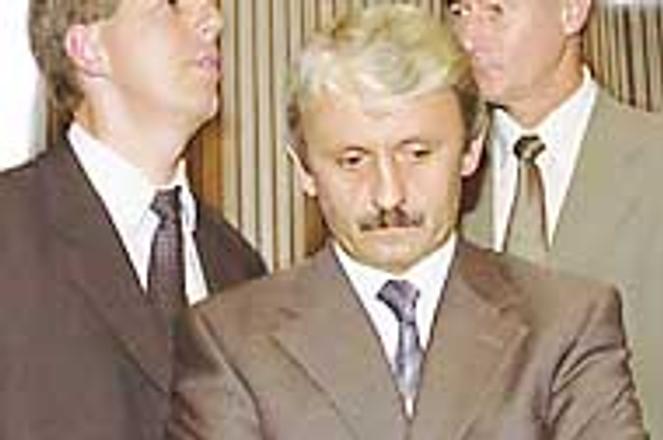PM Mikuláš Dzurinda (centre) flanked by likely coalition party leaders Bugár, Hrušovský and Rusko, left to right.photo: TASR
LESS THAN 24 hours after late September elections gave a parliamentary majority to four right-wing parties, their bosses announced a cabinet deal that promised to give Slovakia what foreign governments had urged - a pro-western and pro-reform administration assembled in record time ahead of crucial Nato and European Union summits.
"The new cabinet will be presented within a fortnight," promised Pavol Rusko of the smallest would-be government party, the New Citizen's Alliance (Ano).
Rusko's Ano, together with PM Mikuláš Dzurinda's Slovak Democratic and Christian union (SDKÚ), the ethnic Hungarian Coalition (SMK) party and the Christian Democrats (KDH), took 78 seats in the 150-mandate parliament in September 20-21 elections.
Urged by Western diplomats to present a new cabinet roster hastily, and thereby give Nato and the EU time to examine the next government for soundness before deciding whether to issue entry invitations, Dzurinda and his three partners on September 23 presented a signed cabinet deal to President Rudolf Schuster.
Schuster, however, was privately irritated at having his authority to offer a mandate to form the government pre-empted, and gave all seven parties who scored over the five per cent needed for parliamentary representation until September 27 to cut a deal with the ostensible cabinet members.
But even the next day it was clear that the winner of the elections, Vladimír Mečiar's opposition Movement for a Democratic Slovakia (HZDS), would be unable to find partners to form a majority coalition.
Mečiar, whose commitment to values shared by Nato and the EU had been doubted before elections, said he was resigned to becoming a rank-and-file member of parliament.
Meanwhile, Robert Fico of the Smer party, which placed third in elections and was earlier expected to play a major role in the next government, also resigned himself to an opposition role after the right-wing parties refused to negotiate with him.
In the ballot, the HZDS gained 19.5 per cent of the vote. The SDKÚ took 15.1 per cent, followed by Smer with 13.5 per cent and the SMK, KDH and Ano recording 11.2 per cent, 8.6 and 8 per cent respectively.
Despite early post-election questions over whether the four parties' two-vote parliamentary majority was solid enough to survive potential wrangles, the election winners sailed through several early tests.
Following a September 24 meeting of the future coalition partners, Dzurinda said that the parties had agreed to a slimmer cabinet, which instead of the current 20 members would have 16 ministers.
The SDKÚ was also permitted to hold six seats in the next cabinet, the SMK four, while the KDH and Ano were to nominate three ministers each.
A new government programme was promised to be scripted by September 27.
The leaders refused to comment on the actual make-up of the new cabinet, with KDH chairman Pavol Hrušovský saying that "first we need to talk about the programme goals, then about names."
Certain so far is that Mikuláš Dzurinda has been accepted by all four allies as the future PM, while powerful SDKÚ politicians Eduard Kukan, Ivan Mikloš and Ivan Šimko are tipped for major cabinet roles.
Kukan is expected to be confirmed in his current Foreign Ministry seat, while Mikloš, currently Deputy PM for Economy and considered a guarantor of fiscal sobriety by foreign investors, is slated for the crucial Finance Ministry post.
Only Šimko, the current Interior Minister, is seen as likely to have to fight for his seat with the KDH.
The KDH's Hrušovský said that "we will insist that the Interior Ministry post is taken by a KDH nominee."
The KDH was also expected to put up fight for the Speaker of Parliament post, as well as to lobby for the Finance, Economy, Justice or Education ministries.
The SMK has said it preferred its current ministers - István Harna of Regional Development and László Miklós of Environment - to remain in their posts, while another SMK candidate was to take the Agriculture Ministry post, which would give the party a major tool to enforce its land claims in the ethnic-Hungarian south of the country.
Rusko's Ano was expected to try for the Education and Health ministries, while it said that the latter should be merged with the Labor Ministry.
Despite forecasts of conflict among the potential coalition partners over individual seats, party chairman played down Hrušovský's insisting on specific posts, saying that they would not comment on the record before an agreement was forged.
"I won't say anything. We'll inform the media when we reach an agreement," said the SMK's Bugár to journalists on September 24.


